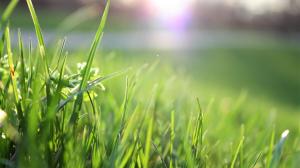The New American Dream for Lawn Care
RALEIGH, NC, UNITED STATES, March 2, 2023 /EINPresswire.com/ -- It’s been called a ‘biological wasteland’, a parasite of our waterways while simultaneously being the darling of Home Owners Associations and a symbol of the American dream. A new study from North Carolina State University suggests that when it comes to lawns, more information might be the key to more imagination.
“It’s not so much the lawn itself that’s the problem,” says Dr. Melinda Knuth, assistant professor of Horticulture at NCSU. “It’s the fertilizers, pesticides, and water you need to grow and maintain the lawn.”
American lawns and gardens use 9 billion gallons of water a day, and almost 60 million pounds of pesticides a year, according to the EPA.
Knuth and colleagues conducted a study in Florida, whose fresh water springs and related ecosystems are fragile, and water restrictions for lawns are already a common occurrence.
"We found that a third of people are already conscious of the resources that lawn requires and are looking for turf grass that requires less water and less fertilizers,’ says Knuth. “We also found that the more people knew about lawns, the more willing they were to seek out those low water, low fertilizer solutions.”
The study also found that homeowners are also willing to pay more for low-input lawns.
Another alternative is to reduce the amount of lawn. “Any lawn not used for play, entertaining or pet romping can be converted to more layered plantings,” says Anne Spafford, professor of horticulture at NCSU and author of Pollinator Gardening for the South. “These tend to look better aesthetically as well as being more ecological.”
Knuth is optimistic “I think most people want to do the right thing for the environment and from an economic perspective. We just have to give them the opportunity.”
This research received no external funding.
Knuth, M.; Wei, X.; Zhang, X.; Khachatryan, H.; Hodges, A.; Yue, C. Preferences for Sustainable Residential Lawns in Florida: The Case of Irrigation and Fertilization Requirements. Agronomy 2023, 13, 416. https://doi.org/10.3390/agronomy13020416
For media inquiries, please contact:
Amanda Solliday
asollid@ncsu.edu
“It’s not so much the lawn itself that’s the problem,” says Dr. Melinda Knuth, assistant professor of Horticulture at NCSU. “It’s the fertilizers, pesticides, and water you need to grow and maintain the lawn.”
American lawns and gardens use 9 billion gallons of water a day, and almost 60 million pounds of pesticides a year, according to the EPA.
Knuth and colleagues conducted a study in Florida, whose fresh water springs and related ecosystems are fragile, and water restrictions for lawns are already a common occurrence.
"We found that a third of people are already conscious of the resources that lawn requires and are looking for turf grass that requires less water and less fertilizers,’ says Knuth. “We also found that the more people knew about lawns, the more willing they were to seek out those low water, low fertilizer solutions.”
The study also found that homeowners are also willing to pay more for low-input lawns.
Another alternative is to reduce the amount of lawn. “Any lawn not used for play, entertaining or pet romping can be converted to more layered plantings,” says Anne Spafford, professor of horticulture at NCSU and author of Pollinator Gardening for the South. “These tend to look better aesthetically as well as being more ecological.”
Knuth is optimistic “I think most people want to do the right thing for the environment and from an economic perspective. We just have to give them the opportunity.”
This research received no external funding.
Knuth, M.; Wei, X.; Zhang, X.; Khachatryan, H.; Hodges, A.; Yue, C. Preferences for Sustainable Residential Lawns in Florida: The Case of Irrigation and Fertilization Requirements. Agronomy 2023, 13, 416. https://doi.org/10.3390/agronomy13020416
For media inquiries, please contact:
Amanda Solliday
asollid@ncsu.edu
Amanda Solliday
Cognitive Behavioral Lab at N.C. State University
email us here
Legal Disclaimer:
EIN Presswire provides this news content "as is" without warranty of any kind. We do not accept any responsibility or liability for the accuracy, content, images, videos, licenses, completeness, legality, or reliability of the information contained in this article. If you have any complaints or copyright issues related to this article, kindly contact the author above.

